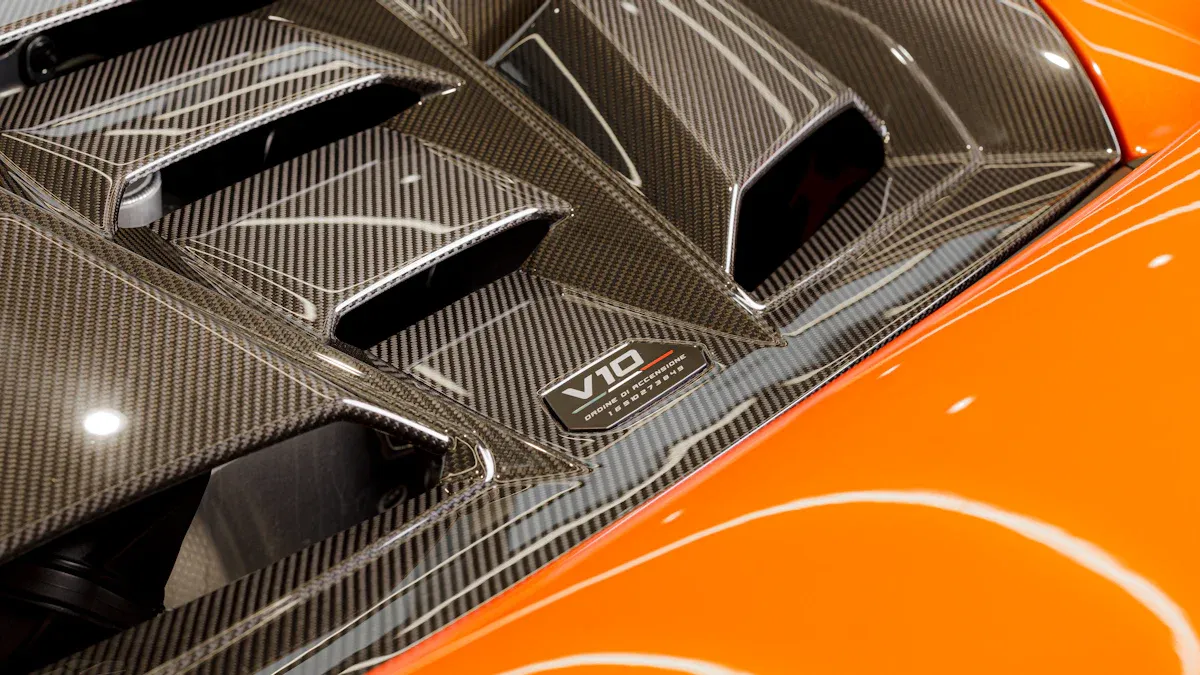EU-compliant custom molds play a pivotal role in meeting 2025 automotive lightweight standards. These molds enable precise shaping of advanced materials, reducing vehicle weight without compromising durability. By optimizing material usage, they help manufacturers lower emissions and align with sustainability goals. Their innovative design supports both regulatory compliance and environmental stewardship.
Key Takeaways
- Custom molds that follow EU rules are important for making lightweight car parts that meet 2025 rules. They shape materials accurately, making cars lighter but still safe.
- Using light materials like aluminum and carbon fiber saves fuel and cuts pollution. Custom molds help use these materials better, supporting eco-friendly goals.
- Buying good custom molds makes manufacturing faster and better. They reduce mistakes, save money, and make it easy to change designs, helping car makers stay competitive.
Understanding 2025 Automotive Lightweight Standards

Key Requirements for Lightweighting
The 2025 automotive lightweight standards aim to reduce vehicle weight while maintaining safety and performance. These standards prioritize the use of innovative materials and advanced manufacturing techniques to achieve weight reduction. Lightweighting is essential for improving fuel efficiency and reducing carbon emissions, which aligns with global sustainability goals.
To meet these requirements, manufacturers must focus on several key areas:
- Material Selection: Lightweight materials such as aluminum, magnesium alloys, and carbon fiber composites are critical. These materials offer high strength-to-weight ratios, ensuring durability without adding unnecessary mass.
- Structural Optimization: Engineers must design vehicle components with minimal material usage while maintaining structural integrity. Techniques like topology optimization and finite element analysis help achieve this balance.
- Advanced Manufacturing: Processes such as injection molding and additive manufacturing enable precise shaping of lightweight materials. Custom molds play a vital role in these processes by ensuring accuracy and repeatability.
Note: Lightweighting is not just about reducing weight. It also involves maintaining safety standards, enhancing vehicle performance, and ensuring cost-effectiveness.
EU Compliance and Regulatory Framework
The European Union has established strict regulations to guide the automotive industry’s transition toward lightweight vehicles. These regulations focus on reducing greenhouse gas emissions and promoting sustainable practices. Compliance with these standards is mandatory for manufacturers operating within the EU market.
Key aspects of the EU regulatory framework include:
- Emission Targets: The EU has set ambitious CO2 emission limits for new vehicles. By 2025, passenger cars must achieve an average emission level of 81 grams of CO2 per kilometer. Lightweighting is a critical strategy for meeting these targets.
- Material Standards: The EU mandates the use of recyclable and environmentally friendly materials in vehicle production. This ensures that lightweighting efforts do not compromise sustainability.
- Testing and Certification: Vehicles must undergo rigorous testing to verify compliance with EU standards. This includes crash tests, emissions testing, and material certification.
Custom molds contribute significantly to meeting these regulatory requirements. They enable the precise manufacturing of lightweight components, ensuring that vehicles meet both performance and environmental standards.
The Role of Custom Molds in Lightweight Automotive Design

Enabling Advanced Lightweight Materials
Custom molds play a critical role in integrating advanced lightweight materials into automotive design. These molds allow manufacturers to shape materials like carbon fiber composites, aluminum alloys, and magnesium into precise components. Each material offers unique benefits, such as high strength-to-weight ratios and corrosion resistance, which are essential for meeting lightweighting goals.
The ability to mold these materials accurately ensures that manufacturers can achieve the desired structural integrity without adding unnecessary weight. For example, carbon fiber composites require precise molding to maintain their strength while minimizing material waste. Custom molds make this possible by providing exact specifications for each component.
Tip: Using custom molds reduces the risk of defects during production, which helps maintain the quality of lightweight materials.
Additionally, custom molds support the use of hybrid materials. These materials combine the properties of different substances, such as metal and plastic, to create components that are both lightweight and durable. By enabling the seamless integration of these materials, custom molds contribute to innovative automotive designs that meet EU standards.
Precision and Efficiency in Manufacturing
Precision is a cornerstone of automotive lightweighting, and custom molds excel in delivering it. These molds ensure that every component is manufactured to exact dimensions, reducing the need for post-production adjustments. This level of accuracy not only saves time but also minimizes material waste, which aligns with sustainability goals.
Custom molds also enhance manufacturing efficiency. They streamline production processes by allowing for faster cycle times and consistent output. For instance, injection molding—a common technique in automotive manufacturing—relies on custom molds to produce complex shapes with minimal effort. This efficiency translates to lower production costs and faster time-to-market for new vehicle models.
Note: Precision in manufacturing also improves vehicle performance. Lightweight components that fit perfectly contribute to better aerodynamics and fuel efficiency.
Another advantage of custom molds is their adaptability. Manufacturers can modify molds to accommodate design changes or new materials, ensuring flexibility in production. This adaptability is crucial for staying competitive in a rapidly evolving industry.
Benefits of EU-Compliant Custom Molds
Environmental and Sustainability Advantages
EU-compliant custom molds significantly contribute to environmental sustainability. By enabling the precise manufacturing of lightweight components, they reduce material waste during production. This efficiency aligns with the European Union’s goals of minimizing resource consumption and promoting eco-friendly practices.
Custom molds also support the use of recyclable and sustainable materials. For example, they facilitate the integration of bio-based composites and other environmentally friendly substances into automotive designs. These materials help manufacturers meet EU regulations while reducing the environmental impact of vehicle production.
Insight: Lightweight vehicles consume less fuel, leading to lower CO2 emissions. Custom molds play a pivotal role in achieving this by ensuring the production of lighter, more efficient components.
Additionally, the durability of components produced with custom molds extends the lifespan of vehicles. This reduces the frequency of replacements, further decreasing waste and resource usage.
Cost and Operational Efficiency
Custom molds enhance cost efficiency by streamlining production processes. Their precision minimizes errors, reducing the need for rework or material wastage. Manufacturers benefit from faster cycle times, which lower operational costs and improve overall productivity.
The adaptability of custom molds allows manufacturers to quickly adjust to design changes or new material requirements. This flexibility ensures that production remains efficient, even as industry standards evolve.
Tip: Investing in high-quality custom molds can lead to long-term savings by reducing maintenance costs and improving production consistency.
Moreover, the use of custom molds supports scalability. Manufacturers can produce large volumes of lightweight components without compromising quality. This capability is essential for meeting the growing demand for sustainable vehicles in the EU market.
EU-compliant custom molds provide a robust solution for meeting 2025 automotive lightweight standards. They enable precise manufacturing of advanced materials, ensuring compliance with EU regulations. By reducing emissions and material waste, these molds drive sustainability. Their role in fostering innovation positions them as essential tools for the future of automotive design.
FAQ
What are EU-compliant custom molds?
EU-compliant custom molds are specialized tools designed to manufacture lightweight automotive components. They meet European Union regulations for sustainability, emissions, and material standards.
How do custom molds improve manufacturing efficiency?
Custom molds enhance efficiency by ensuring precise dimensions, reducing errors, and minimizing waste. They streamline production processes, saving time and lowering operational costs.
Why are lightweight materials important for automotive design?
Lightweight materials reduce vehicle weight, improve fuel efficiency, and lower emissions. They also maintain structural integrity, ensuring safety and performance standards are met.
Post time: Apr-16-2025
